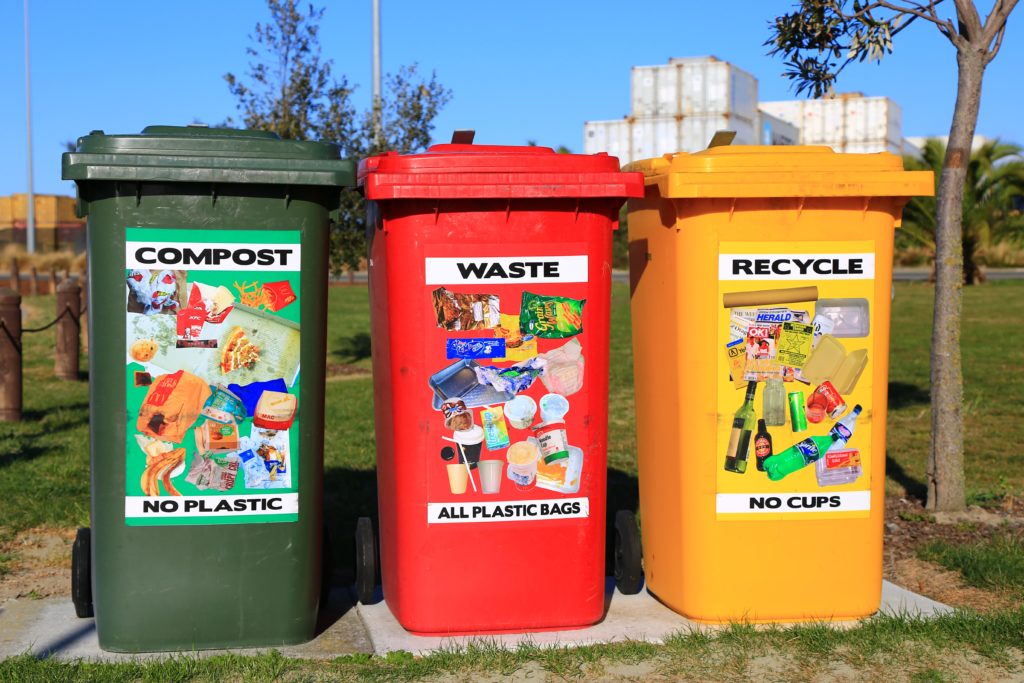Opinion: Local and Green – Amherst’s Historic Commitment To Zero Waste

Photo: Nareeta Martin / Unspalsh
This column appeared previously in the Amherst Bulletin.

At this point in history, we need dramatic waste reduction. It is an important element of the “new normal.” We are urgently trying to reduce greenhouse gas emissions. We have new awareness of how pollution near landfills and incinerators affects climate justice communities. We are rethinking our consumption and waste practices based on new research on toxins, including “forever chemicals” such as PFAS. Last but not least, we are simply running out of landfill capacity.
Zero Waste Amherst has a proposal to the Town Council that would reduce our trash and its polluting effects using a simple solution. The town can directly contract with the local hauler and include in that contract universal compost pick up. Then, 40% of our “trash” would go in the compost bin, including food scraps, compostable take out containers, and dirty paper. And you could also add in your yard waste. If we are like other communities that have done this, we would also save residents and the town money.
With so much Amherst resident turnover in the last 20 years, we have forgotten some of our collective history around the issue of waste reduction — and the deep commitment that the town and Department of Public Works in particular has shown over the years. The commitment has been shown in many ways, including by hiring full time waste reduction coordinators, by hiring coordinators for the schools, by the work of a Recycling and Refuse Management Committee, by expanding our waste, recycling and compost services and by the creation of a Solid Waste Master Plan.
Providing the staff and volunteers to make waste reduction happen in Amherst has always been a priority. But in 2019, the town found itself without a recycling coordinator for the first time in 19 years, and without a resident waste reduction advocacy committee for the first time in 21 years.
It’s notable that Shutesbury, Greenfield, South Hadley, Northampton, Williamsburg, East Longmeadow, Springfield and Agawam all have recycling coordinators.
Let’s look at our town history to see how waste reduction has always had enthusiastic support in Amherst.
I recently ran into one of our early recycling coordinators, Carolyn Holstein, and she reminded me of some of our history. She is one of six former full-time and two former part-time coordinators.
In the late 1980s and early 1990s, the town was a hotbed of waste reduction advocacy. In 1988, it created the first Solid Waste Committee. In its first year, the committee convened a meeting of major waste generators (apartment complexes) and waste haulers, started a program of recycling with red and blue boxes, and endorsed four articles at Town Meeting.
In 1990, the town hired its first full-time recycling coordinator. Amherst was quickly in the limelight due to the statewide recognition received for Karen Bouquillon’s stellar outreach and advocacy during her term from 1992-96. The town also hired a part-time waste coordinator for the schools.
Bouquillon was followed by three more full-time recycling coordinators who expanded the recycling program into the schools, started the Transfer Station resident permit program and expanded composting via the sale of home compost bins and kitchen compost pails.
In 2002, Guilford Mooring was hired as DPW superintendent. He was and continues to be a big supporter of recycling and composting. He supervised the transition from an active landfill to a transfer station operation.
With Northampton, the town applied for and received a Department of Environmental Protection grant to promote compost pickup at schools and restaurants. The schools and several Amherst downtown restaurants started collecting compost and it was trucked to Martin’s Farm in Greenfield.
In 2005, the recycling coordinator hours were cut to 15 per week. Susan Waite served part time from 2006-2015, during which time many initiatives were undertaken. In addition to the development of the town’s first Solid Waste Master Plan, food waste collection was initiated at the transfer station and most of the town’s public schools, and a food-related expanded polystyrene (Styrofoam) ban was implemented . Susan left in 2015 after she was offered a full-time position in Northampton.
That year marked more resident advocacy on waste reduction by the active Recycling and Refuse Management Committee, chaired by John Root and encouraged by Town Manager John Musante. The committee submitted the Solid Waste Master Plan to the Select Board for adoption in 2016. The public forums and community survey conducted as part of that effort revealed that 62% of residents felt that compost should be diverted from trash and 69% wanted curbside compost pick up.
In January of 2017, instead of adopting the plan, the Select Board took the recommendations under advisement. New Town Manager Paul Bockelman stated at that meeting that a possible “low-hanging fruit” initiative that the town could undertake would be asking the haulers to provide curbside compost pick up. Shortly thereafter, the RRMC was dissolved with the understanding that its efforts would be continued by a new sustainability committee.
At the same time, the DPW received a two-year matching grant to fund a waste reduction enforcement coordinator. At the end of the grant, Enforcement Coordinator Mimi Kaplan provided a final report with recommendations, including an urgent recommendation that the town directly fund a full-time waste reduction coordinator position.
Amherst has a long history of progressive solid waste management practices. A goal of the Zero Waste Amherst committee is to ensure that that legacy continues. In my next column, I will explain how the waste hauler landscape has dramatically changed recently, how those changes have affected residents and the environment, and what we can do to promote positive change.
Carolyn Holstein and John Root contributed to this column.
Darcy DuMont is a founding member of Zero Waste Amherst and of Local Energy Advocates of Western MA. As a town councilor, she sponsored the legislation creating the Amherst Energy and Climate Action Committee.
